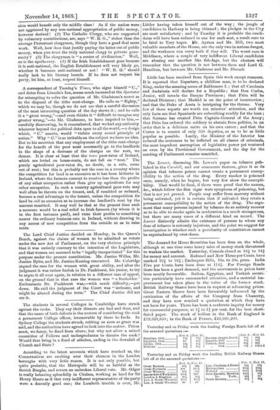A correspondent of Tuesday's Times, who signs himself "C.," and
dates from Lincoln's Inn, seems much incensed at the Spectator for attempting to solve the question of Mr. Gladstone's secret as to the disposal of the tithe rent-charge. He calls us " flighty," which we may be, though we do not see that a careful discussion of the most interesting question of the day shows it ; and he calls it a " great wrong,"—and even thinks it " difficult to imagine any greater wrong,"—to Mr. Gladstone, to have imputed to him,— carefully disavowing, be it remembered, that we had any authority whatever beyond the political data open to all the world,—a design which, " C." asserts, would "violate every sound principle of Action." Why " C." is so irritable on the subject we have no idea. But to his assertion that any employment of the tithe rent-charge for the benefit of the poor must necessarily go to the landlords in the shape of a decrease of the charges on the rent, we demur. It is clear at least that the town poor-rates of Ireland, which are levied on house-rents, do not fall on " rent." The purely agricultural poor-rates do, no doubt, as a rule, come out of rent ; but this is probably not the case in a country where the competition for laud is as excessive as it has been hitherto in Ireland, where the farmers consent to receive less than the profits -of any other occupation rather than give up agriculture for any -other occupation. In such a country agricultural poor-rate may well often be thrown on the tenant, and, if remitted or reduced, become a real advantage to the tenant, unless the competition for land be still so excessive as to increase the landlord's rent by the amount remitted. It may well be that at the present time such A measure would be a real relief to Irish farmers (by whom it is in the first instance paid), and raise their profits to something nearer the ordinary business rate in Ireland, without drawing in any access of new competition from the outside so as to raise rents.


































 Previous page
Previous page